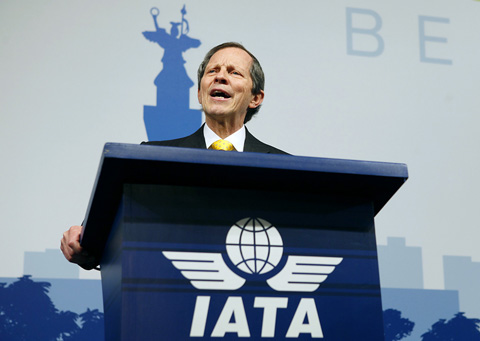The airline industry will post a US$2.5 billion profit this year, reversing two years of losses, the International Air Transport Association (IATA) said yesterday, scrapping an estimate for a US$2.8 billion deficit as the economy rebounds.
The profit would be the industry’s first since 2007 and only the third in a decade after previous results were afflicted by recession, terrorist attacks, epidemics and wars.
Europe is the only region that is still expected to lose money this year.

PHOTO: REUTERS
Prospects for carriers have improved in the past few months as economic growth in Asia and the US boosts demand for travel and capacity cuts imposed last year bolster ticket prices.
IATA had been predicting a loss as recently as March 11.
“The global economy is recovering from the depths of the financial crisis much more quickly than could have been anticipated,” IATA chief executive officer Giovanni Bisignani said yesterday in a statement to the organization’s annual meeting in Berlin. “Airlines are benefiting from a strong traffic rebound that is pushing the industry into the black.”
Collective revenue is forecast to total US$545 billion this year, up 13 percent from US$483 billion last year, when the industry lost about US$10 billion.
IATA said it would take two years instead of three for sales to recover to peak levels, given anticipated growth this year of 7 percent in Asia and 3.3 percent in the US.
Bisignani also said that yields, a measure that equates to average fares, will grow by 4.5 percent for both passenger and cargo businesses after falling 12 percent last year.
IATA, which represents 230 airlines carrying 93 percent of international traffic, estimates that jet fuel will represent 26 percent of operating costs this year, up from 23 percent last year. Brent crude oil will average US$79 a barrel, it estimates.
Despite the general recovery, European airlines will lose about US$2.8 billion this year, IATA said, US$600 million more than the March estimate.
This was after the eruption of Iceland’s Eyjafjallajokull volcano on April 14 closed airspace for six days and grounded 100,000 flights.
The event cost the industry US$1.8 billion, with US$1.26 billion of those losses in Europe.
Asia-Pacific carriers are expected to earn US$2.2 billion this year, up from the March forecast of US$900 million. The region lost US$2.7 billion last year.
In North America, airlines will probably post a profit of US$1.9 billion, IATA said, versus a prior prediction for a US$1.8 billion loss.
IATA’s projections are based on information from members, which don’t include discount airlines such as Southwest Airlines Inc, Ryanair Holdings PLC and EasyJet PLC.

MORE VISITORS: The Tourism Administration said that it is seeing positive prospects in its efforts to expand the tourism market in North America and Europe Taiwan has been ranked as the cheapest place in the world to travel to this year, based on a list recommended by NerdWallet. The San Francisco-based personal finance company said that Taiwan topped the list of 16 nations it chose for budget travelers because US tourists do not need visas and travelers can easily have a good meal for less than US$10. A bus ride in Taipei costs just under US$0.50, while subway rides start at US$0.60, the firm said, adding that public transportation in Taiwan is easy to navigate. The firm also called Taiwan a “food lover’s paradise,” citing inexpensive breakfast stalls

TRADE: A mandatory declaration of origin for manufactured goods bound for the US is to take effect on May 7 to block China from exploiting Taiwan’s trade channels All products manufactured in Taiwan and exported to the US must include a signed declaration of origin starting on May 7, the Bureau of Foreign Trade announced yesterday. US President Donald Trump on April 2 imposed a 32 percent tariff on imports from Taiwan, but one week later announced a 90-day pause on its implementation. However, a universal 10 percent tariff was immediately applied to most imports from around the world. On April 12, the Trump administration further exempted computers, smartphones and semiconductors from the new tariffs. In response, President William Lai’s (賴清德) administration has introduced a series of countermeasures to support affected

CROSS-STRAIT: The vast majority of Taiwanese support maintaining the ‘status quo,’ while concern is rising about Beijing’s influence operations More than eight out of 10 Taiwanese reject Beijing’s “one country, two systems” framework for cross-strait relations, according to a survey released by the Mainland Affairs Council (MAC) on Thursday. The MAC’s latest quarterly survey found that 84.4 percent of respondents opposed Beijing’s “one country, two systems” formula for handling cross-strait relations — a figure consistent with past polling. Over the past three years, opposition to the framework has remained high, ranging from a low of 83.6 percent in April 2023 to a peak of 89.6 percent in April last year. In the most recent poll, 82.5 percent also rejected China’s

PLUGGING HOLES: The amendments would bring the legislation in line with systems found in other countries such as Japan and the US, Legislator Chen Kuan-ting said Democratic Progressive Party (DPP) Legislator Chen Kuan-ting (陳冠廷) has proposed amending national security legislation amid a spate of espionage cases. Potential gaps in security vetting procedures for personnel with access to sensitive information prompted him to propose the amendments, which would introduce changes to Article 14 of the Classified National Security Information Protection Act (國家機密保護法), Chen said yesterday. The proposal, which aims to enhance interagency vetting procedures and reduce the risk of classified information leaks, would establish a comprehensive security clearance system in Taiwan, he said. The amendment would require character and loyalty checks for civil servants and intelligence personnel prior to